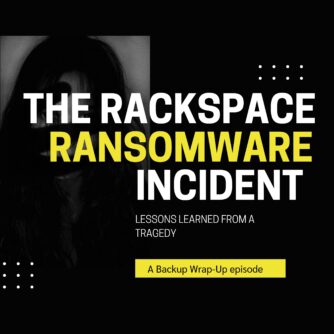At Tech Field Day 5, we learned about Druva (formerly Druvaa), who has developed a completely new mobile backup product. Not sure if the world needed another one, I listened closely to how they were going to differentiate themselves. First, I can say that they definitely understood the needs of the mobile backup market. It’s very difficult to backup large amounts of data over very small, very unreliable connections while simultaneously remaining virtually invisible to the end user. But at least they know that’s what they have to do to be successful.
They claim to do this using application-aware deduplication, where they understand 87 different data types, and dedupe them all in the optimum way for that application. (The story reminded me very much of Ocarina’s story.) They don’t start backing up the machine as soon as there is a connection; they wait a user-configurable time (default 15 mins) before starting up.
They also automatically detect the type of connection you’re using, and alternate between smaller/bigger packet sizes, more/less compression, fewer/more connections based on what they observe the connection to behave like.
The client side of the application is 40 MB, which is a relatively small size these days.
There is definitely a market for this type of product. There are also a number of “dead soldiers” in that market. I hope that Druva is able to exactly what they say and is able to differentiate themselves enough to carve out their own niche. One interesting fact is that they got 600 customers before they officially launched the product. Perhaps they will be different!
Written by W. Curtis Preston (@wcpreston), four-time O'Reilly author, and host of The Backup Wrap-up podcast. I am now the Technology Evangelist at Sullivan Strickler, which helps companies manage their legacy data







Thanks Curtis !
Nice article. I strongly feel the time is right for end-point data protection and hope to succeed.
PS: The link to druva.com is broken in your article.
With the growth of mobile and remote offices and workers, endpoint data keeps growing. But no one on the Enterprise side of things is paying it the kind of attention it deserves. Druva sounds like the first real development in this area in a long time.
Real challenge with endpoint protection products is they are quite different than enterprise data protection suites. Customers in my mind are not interested in adding another backup product that they need to manage.
Also, there is classic debate on what is stored on endpoints that needs protection? Aren’t endpoints becoming thinner already? Cloud would make it for sure. So the need of endpoint protection products in future is really doubtful.
It would be really nice if any enterprise data protection product starts offering endpoint protection but not as a seperate product. It should support features like global de-duplication across laptops, desktops, business servers etc. Most of the data on endpoints is duplicate and already protected using enterprise data protection software anyways.
NitinS, enterprise data backup products supporting laptops and iPads is like one truck for all your needs. Sure a truck is a driving vehicle, but can that solve all your needs ?
But it makes sense to add data protection features to a product like Druva inSync. I get your point there.
The fact of the matter is that a lot of users are storing data on end-points. Show me a CIO who’s laptop is completely expendable. Its definitely a huge productivity loss apart from being a data loss. Read Intel’s report here – http://blog.druva.com/2010/12/06/lost-laptops-a-billion-dollar-problem/
600 customers in just 18 months, including some great corporate accounts says something.
Disclaimer: I work for Druva
@Curtis,
The client binaries are much smaller than reported in the article(just 20 MB). Server is approx 40 MB. Nice article anyways. 🙂
@NitinS,
How do you think you can manage two different requirements with one single backup solution?
Backing up servers, – Complete liberty in terms of bandwidth and no data security risk over WAN. Its the exact timing of the backups that is important – Server triggered backups make sense
Backing up laptops, – Bandwidth restrictions, data security is a major concern. – Its the most opportunistic scheduling of the backups that make a lot of sense – Client triggered backups are most suitable here.
@adie
I agree with you that enterprise server protection and laptop protection are certainly two different things with different feature requirements. Customers are already struggling with too many data protection solutions to protect their enterprise data. Addition of another product to protect endpoints doesn’t go well with them. Instead if Enterprise data protection products start offering endpoint protection with required feature set with same backend (de-duped one perhaps!) would be more acceptable.
@Jaspreet
I agree that lot of users including myself still put lot of data on endpoints that doesn’t get protected via enterprise data protection software but I believe it has more to do with right process and workflows in the organization. Today PST file contribute to major amount of data on Laptops. In case, email archival solution is in place, need of PST goes away. Same way, if file shares, sharepoints used effectively, endpoints would have very less unique, unprotected data that would be required to be protected. Also eventually you would have thin clients like tablets that would read/ write everything to/ from cloud. in such case, there would be limited scope for endpoint protection. Number of customers you have got in last 18 months says different story. May be I am wrong. Wish you all the best!
@ NitinS
1- Your point is very genuine and it makes sense to have a centralized approach towards the entire backup scenario. Both the necessary features for these two scenarios (server protection & endpoint protection, as I described in my previous comment ) could be provided in a single solution (may be two different modules sharing a single control panel) to make it more manageable.
2- It will take some time for the entire backup storage to get shifted to cloud. Even after considering the predicted/expected increased volume of tablets, the complete replacement of the entire laptop scenario from business paradigm (where apart from PSTs, some really important/crucial business data e.g. ppts, xl charts, videos and notes reside) seems far.
being forced into this backup system as a user i can only say – it’s not going to work for companies > 2 persons. Patch quality is also questionable.